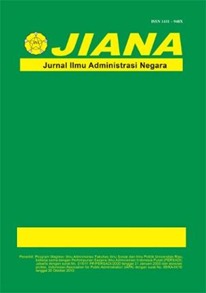PELAKSANAAN ISOLASI MANDIRI (ISOMAN) DI FASILITAS ISOLASI MILIK PEMERINTAH DAERAH
DOI:
https://doi.org/10.46730/jiana.v20i1.8018Keywords:
implementation, self-isolation, COVID-19, local government self-isolation facilities, PekanbaruAbstract
Abstract: This study aims to evaluate the implementation of self-isolation in local government isolation facilities based on the perception of Covid-19 in Pekanbaru City. This research combines quantitative and qualitative research methods with sequential explanatory research. The quantitative method uses online surveys while the qualitative method uses documentation studies, in-depth interviews, and observations. Analysis of quantitative data was carried out using descriptive statistical analysis in the form of frequency tables and graphs. Qualitative analysis was carried out through data collection, data reduction, data presentation, and conclusion. Qualitative analysis is intended to explain the results of quantitative analysis. The results of the study found that there are infrastructures of local government isolation facilities that still need to be improved, namely: entertainment and internet facilities, sports and waste management, and infectious waste. Most of the respondents assessed that the service at the local government isolation facilities was very good (62.71%) but the fulfillment of patient needs for data and internet was 42.37%) and entertainment (66.10%) was still not good. Implementation of self-isolation at the local government facilities is influenced by community participation and compliance, enforcement of sanctions, financial support, availability of facilities, data, and information, and coordination between relevant stakeholders. Based on these findings, this study recommends several things, including improvement of infrastructure in the local government self-isolation facilities, the availability of government support for self-isolation patients, both financial and non-financial, strengthening coordination between the COVID-19 Task Force, and improving the quality of data and information.
References
Ahmad Fauzi. 2020. “Implementasi Pembatasan Sosial Berskala Besar, Sebuah Kebijakan Publikdalam Penanganan Pandemi Covid-19.” Jurnal Ilmu Administrasi Negara 16.1: 174–78.
Ambarwati, Wiwi. 2021. “Pembiayaan Pasien COVID-19 Dan Dampak Keuangan Terhadap Rumah Sakit Yang Melayani Pasien COVID-19 Di Indonesia Analisis Periode Maret 2020 – Desember 2020.” Jurnal Ekonomi Kesehatan Indonesia 6 (1): 23–37. https://doi.org/10.7454/eki.v6i1.4881.
Amirudin, A. 2021. “The Impact of the Covid-19 Self-Isolation Policy on the Occupations of Vulnerable Groups.” International Journal of Environmental Research and Public Health 18 (12). https://doi.org/10.3390/ijerph18126452.
Arden, M A, L Lewis C.J. Armitage E. Whittaker, J. Hart, D.B. O’Connor, P. Chadwick, J. Drury, V. Swanson, L. Byrne-Davis, E. McBride, S. Perriard-Abdoh, G W Shorter, T Epton, A Kamal, and & A Chater. 2020. “Encouraging Self-Isolation to Prevent the Spread of Covid-19.” http://www.nidirect.gov.uk/articles/coronavirus-covid-19-staying-home-and-self-isolation.
Bezerra, C B. 2020. “Psychosocial Impact of COVID-19 Self-Isolation on the Brazilian Population: A Preliminary Cross-Sectional Analysis.” Saude e Sociedade 29 (4): 1–10. https://doi.org/10.1590/S0104-12902020200412.
Bhardwaj, Pankaj, Nitin Kumar Joshi, Manoj Kumar Gupta, Akhil Dhanesh Goel, Suman Saurabh, Jaykaran Charan, Prakash Rajpurohit, et al. 2021. “Analysis of Facility and Home Isolation Strategies in Covid 19 Pandemic: Evidences from Jodhpur, India.” Infection and Drug Resistance 14 (May): 2233–39. https://doi.org/10.2147/IDR.S309909.
Cencetti, Giulia, Gabriele Santin, Antonio Longa, Emanuele Pigani, Alain Barrat, Ciro Cattuto, Sune Lehmann, and Bruno Lepri. 2020. “Using Real-World Contact Networks to Quantify the Effectiveness of Digital Contact Tracing and Isolation Strategies for Covid-19 Pandemic.” Medrxiv, no. May: 6–11. http://medrxiv.org/cgi/content/short/2020.05.29.20115915.
Chadsuthi, Sudarat, and Charin Modchang. 2021. “Modelling the Effectiveness of Intervention Strategies to Control COVID-19 Outbreaks and Estimating Healthcare Demand in Germany.” Public Health in Practice 2 (September 2020): 100121. https://doi.org/10.1016/j.puhip.2021.100121.
Escandon-Barbosa, D. 2021. “Factors Affecting Voluntary Self-Isolation Behavior to Cope with a Pandemic: Empirical Evidence from Colombia vs. Spain in Times of Covid-19.” Behavioral Sciences 11 (3). https://doi.org/10.3390/bs11030035.
Febriani, Dyah, Valeryan Bramasta, and Vanissa Noorizqa. 2020. “Evaluation of Government Policy Readiness in the Management of the Covid-19 Pandemy Viewed From the Implementation of Dynamic Governance.” Research Gate, no. April.
Holmes, Emily A., Rory C. O’Connor, V. Hugh Perry, Irene Tracey, Simon Wessely, Louise Arseneault, Clive Ballard, et al. 2020. “Multidisciplinary Research Priorities for the COVID-19 Pandemic: A Call for Action for Mental Health Science.” The Lancet Psychiatry 7 (6): 547–60. https://doi.org/10.1016/S2215-0366(20)30168-1.
Nicola, Maria, Zaid Alsafi, Catrin Sohrabi, Ahmed Kerwan, Ahmed Al-Jabir, Christos Iosifidis, Maliha Agha, and Riaz Agha. 2020. “The Socio-Economic Implications of the Coronavirus Pandemic (COVID-19): A Review.” International Journal of Surgery 78 (March): 185–93. https://doi.org/10.1016/j.ijsu.2020.04.018.
Omiya, Y. 2020. “How Much of an Impact Did COVID-19 Self-Isolation Measures Have on Mental Health?” Asian Journal of Psychiatry. https://doi.org/10.1016/j.ajp.2020.102445.
Pambudi, Dwi Bagus, Rela Pamungkas Sari, and Risqi Dewi Aisyah. 2021. “Regulatory Evaluation Related to Managing The Spread of Covid-19 in Indonesia.” Soepra 7 (1): 136. https://doi.org/10.24167/shk.v7i1.2923.
Downloads
Published
How to Cite
Issue
Section
License
The copyright of the received article shall be assigned to the journal as the publisher of the journal. The intended copyright includes the right to publish the article in various forms (including reprints). The journal maintains the publishing rights to the published articles.
Authors are permitted to disseminate published articles by sharing the link/DOI of the article at the journal. Authors are allowed to use their articles for any legal purposes deemed necessary without written permission from the journal with an acknowledgment of initial publication to this journal.

Jurnal Ilmu Administrasi Publik is licensed under a Creative Commons Attribution-NonCommercial-ShareAlike 4.0 International License.




